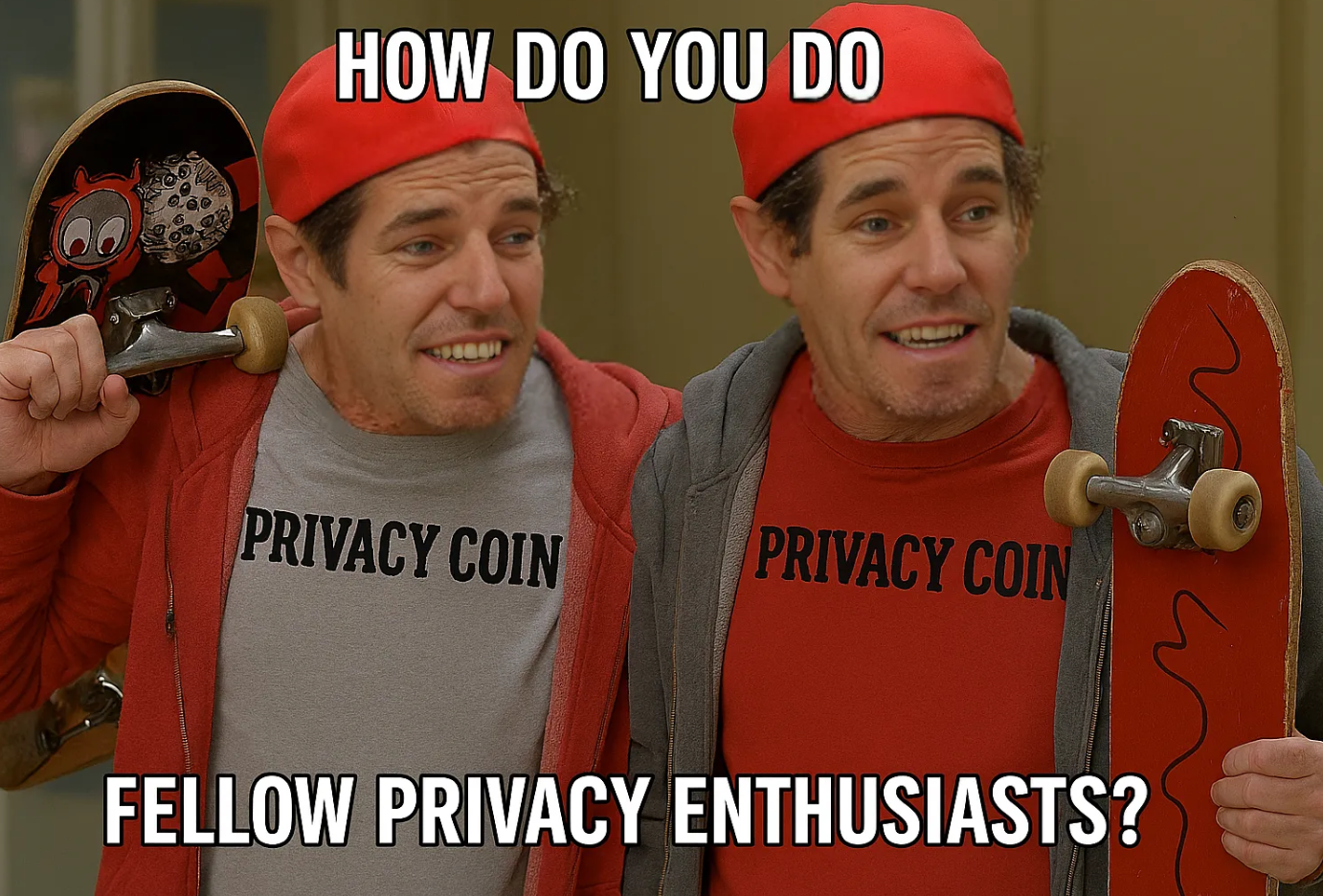Elevated Zcash is healthy for Bitcoin
In March 2022, The What Bitcoin Did Podcast invited me down to Austin TX to record an episode. They knew just a little bit about me: they knew I was a mathematician and that I was a skeptic. When I arrived at the Airbnb in Austin to record the interview they told me that Andrew Poelstra (prominent Bitcoin dev with a pedigree in mathematics) was going join me. He didn't show and they started the interview without him; eventually he texted to say he couldn't make it. During the interview I mentioned the concern of selfish mining. Peter asked what selfish mining was; I started to explain while Danny was googling it - he came up with an article describing how it was "fake" and I told him to look who wrote the article (Craig Wright) and I think they were convinced selfish mining was real.
So then I asked the question: What if you observed a single corporation start to selfish mine? What would you do? Quickly both Peter and Danny understood what I was asking and fell to slightly different sides. Peter at first thought he would sell but then realized he didn't know what he would sell Bitcoin for, probably not a fiat, certainly not a shitcoin. He wasn't sure what he would do.. Danny, on the other hand was more convinced that he would no choice but to sell. I don't remember 100%, but I believe he mentioned Monero. It was clear to Danny that if one corporation was taking over all of Bitcoin this was no longer Bitcoin and this was not acceptable. Peter recognized this, but was very reluctant to put all his money in fiat or a shitcoin.
I'd absolutely made my point; the answer to the question of what would happen if one corporation or cabal of corporations decided to take over the network is very far from obvious.
For years, the conventional wisdom had been that nobody would ever do this. In the short term it was an impossible coordination task, but more importantly, nobody would attempt a takeover of Bitcoin mining, because as Danny's response suggested, that would destroy Bitcoin and the prize would be worthless Bitcoin.
If we remove the possibility that monopoly would destroy Bitcoin, the incentives for a large miner to acquire rival miners and begin selfish mining and snowball this to a 51% takeover are clear: You get to keep all the mining profits, but for 51% of the cost. As industry margins compress over time, this could turn a tiny net profit to a windfall. As other miners leave the game, you can ease the 51% cost down even further.
As Peter demonstrated, the ideals of maximalism and decentralization collide when you consider the possibility that a single miner could monopolize the system (this is always possible as 51%<100%; it's just a matter of coordination and incentives). By pariahfying fiat and shitcoins, maximalists paint themselves into a corner.
For Bitcoin to say decentralized, it has to be able to fail - but maximalism doesn't allow for a world where it can fail.
To Peter's point
The problem is fairly clear. If you're a long-term hodler of Bitcoin, you don't really want to dump your money back into fiat. But on the other hand, many of the crypto projects are objectively scammy, complete departures from the Bitcoin ethos.
Ethereum is a "world computer" used for all sort of degenerate purposes; Solana is really just a fancy version of Ripple. Many projects are just trying to replace tradfi rails, some are even trying to partner with sovereigns to replicate fiat. Even the open-minded maximalist would agree that 99% of the stuff out there is in the opposite direction as what many would consider the founding values of Bitcoin.
Enter Zcash
I don't mean to particularly shill Zcash, that's not really the point here (I own 1 ZEC, if you're asking), but there is a narrative that Zcash has possibly accomplished something which is much closer to what Bitcoin set out to do: It's a 21 million supply coin with massive built-in privacy improvements over Bitcoin. (Obviously we could argue details, but the point is, the narrative is there and many people find it compelling. I trust the math is good, but like everything else in crypto, privacy still has some "final mile" problems.)

Zcash seems to be more technically advanced then Monero, they seem to have some of the world's best privacy developers working on it. Despite the usual fiat scammers who are pumping it at the moment, it does seem like a solid project, and more importantly, a workable privacy solution for people who might find themselves needing privacy. It very much could be what Bitcoin was supposed to be. At the minimum it's a functioning privacy coin.
What I'm suggesting is that it could be something that would satisfy people if they felt the need to jump out of Bitcoin into something with true Bitcoin values. There needs to be an answer to Peter's concern: what coin could I go into?
This is important for the game theory: Potential enthusiasm for a competing coin that would be palatable to maximalists in worst case scenarios, may make Bitcoin fragile enough so that the miners won't dare mess with it.
FWIW, I don't think think a privacy coin at multitrillion dollar scale is sustainable. It's just not going to happen that powers that be sit back and allow a situation where you have massive liquidity pool allowing hackers, terrorists, North Korea, pigbutcherers, etc to slide seamlessly in and out of. There are things they can do to mute corporate 'adoption.' I would imagine this "pump" will not get much higher than 0.01 Bitcoin / ZEC, but that's probably enough.
The important thing is that having a backup for some nontrivial chunk of OG Bitcoiners to retreat to is crucial to the continued decentralization of Bitcoin.
Bitcoin has for the last 8 years or so been an unequal yoking of cypherpunks and bankers who want another asset to play around with. One group cares about decentralization, the other not so much, except for the marketing mystique of the whole thing. Most bankers probably think Bitcoin is just some magically clever decentralized algorithm that some clever mathematician came up with and will stay that way forever; they will think this until the day you tell them that it's no longer decentralized, at which point they will probably shrug, and say "ok, I guess it's not. So what?" It's not something they are forced to think about deeply.
To be clear, the threat is real
If you've been paying attention to mining industry - things are getting crazy out there. Mining corporations are engaging in very large scale financial engineering to buildout Gigawatts of power to fund the AI boom. There's now several corporations producing ASICS at single digit J/TH numbers. A not-too-crazy scenario: Suppose The AI-pivot continues to surge and then goes a little sideways in 2027, and there are several mining corporations with massive energy infrastructure and huge debt. They can all fight each other for meager profits as the halving approaches, or they can consolidate and start selfish mining.
It's possible then, that an ambitious large miner could just go for it - do a couple merges and acquisitions to get to 34%, start hoovering up ASICS that come out of production, and start selfish mining. What's the incentive not to?
The major disincentive is that their revenue would take a nosedive as Bitcoin crashed as a response to their actions. But why would they have any reason to believe this would happen?
That's where a zcash knocking on the door comes in handy. If there's a crowd of people chomping at the bit to jump to "the real Bitcoin", and miners centralizing is the excuse to do this, the miners ought find it more profitable not to monopolize.



